|
I have not made a statement regarding George Floyd's murder or the subsequent protests happening around our country, and in fact, the world. I thought it was not my place to speak. This was a mistake.
I am a local author, and although my platform is small, I still have a voice and a responsibility to use it. Therefore, I commit myself to the following:
I'll end this post with words from author and Nobel Peace Prize recipient Elie Wiesel, "We must take sides. Neutrality helps the oppressor, never the victim. Silence encourages the tormentor, never the tormented."
3 Comments
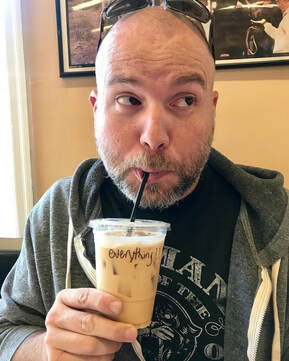 My last novel was published in November of 2017. That's why I'm excited to reveal that my next novel, the long-awaited sequel to my debut ANOM: Awakening, is CLOSE to being finished. But what does that mean and how close is close? Whenever I write a book, it looks something like this: First Draft, Second Draft, Beta Reading, Third Draft, Professional Editing, Final Draft, Publish. The ANOM sequel is almost ready for BETA READING. This is the step where I send my unfinished novel to family and friends, and in turn, they read my novel, and lovingly tell me all the reasons why its terrible and should be destroyed on sight. If it sounds scary... it is. In all honesty, Beta Reading is both my favorite and my most anxious phase of writing. On the good side, there are few moments as satisfying for a writer as landing an emotional beat with your audience. Whether you were trying to engender laughter, tears, or a gasp of surprise... realizing that your words have affected others exactly as you intended is near euphoric. I imagine it's like a gymnast sticking a perfect landing. Of course, the opposite side of the coin exists as well. Beta Reading will reveal all the blind-spots we cling to as writers. When you hear that your favorite character is hated by everyone else, or the tension you've been building in that climactic moment falls flat, it can leave you questioning your skills and instincts as a writer. The silver-lining is that there's still time to fix these mistakes. In fact, identifying these missteps is exactly what a Beta Reading is for. So, how can you create an effective Beta Reading for your future novel, short story, play, etc.? You have to begin with people you trust. First, you need to trust them to do the work - because Beta Reading IS work. You're asking someone else to devote their time and energy not only to reading your work, but also to analyzing your work and sharing that analysis with you at a later date. If you think that sounds like homework, that's exactly what it is. You also need Beta Readers that you can trust to tell you the truth. Hearing all the good things about your novel may boost your ego, but it seldom helps you improve your writing. You need Beta Readers who are unafraid to point out your mistakes and shortcomings. At the same time, you, as the writer, need to be willing to listen and accept that criticism - rather than defending yourself at every possible turn. If you consistently shutdown your Beta Readers by arguing with them over their opinions, they'll learn soon enough that it's better to keep silent. After I've chosen my team, I establish a deadline. Depending on the length of my novel, I'll give my readers 1-2 months to finish reading my book and prepare their criticism. I want everyone to have enough time so that they don't feel rushed or harried in getting the work done, but I don't want to give them too much time so that the project gets shelved and forgotten. When the deadline arrives, I host a conference for all of my Beta Readers, either in person or through teleconferencing, so that we can discuss the book together. I think there's value in receiving feedback through this group discussion (instead of 1-on-1) because one comment will often lead to another, and another, and another, and patterns are quickly established. For example, if everyone in your group agrees that they hate chapter 5, it's hard to argue that Chapter 5 shouldn't be changed. Finally, I give my BETA READERS a list of questions to help focus their thoughts. I've included the questions here in case anyone wants to borrow them:
A Beta Reading can be a daunting step in the writing process. It may be the first time than anyone else is reading your new book, but it's also an important tool to sharpen your writing before publication. I hope you can use these suggestions in your own writing, as we continue to work at improving our craft. Most importantly, no matter where you are in your own process, write on... 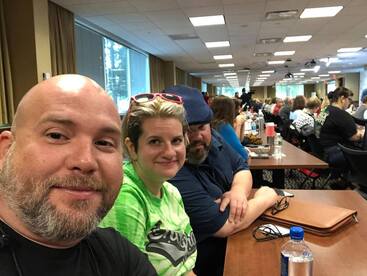 It's time for the third and final installment in my series on some of the common obstacles I face in my writing. Today, I'll attempt to tackle the problem of ghosts - what are they and why do they stop us from writing? What is a Writing Ghost? For me, at least in my writing, a ghost is the specter of my own past success, and just like a "real" ghost, it can come back to haunt my future projects. In truth, it's really just another version of impostor syndrome. If you're unfamiliar with impostor syndrome, you can read about it here. There's also a great story about Neil Gaiman dealing with his own bout of impostor syndrome here. In writing, my personal ghost stems from the ironclad belief that any past success I've enjoyed was achieved almost completely by accident. It's the old anecdote that if a million monkeys sat at a million typewriters working for all of eternity, one of them would eventually write MacBeth. In my mind, I am that monkey (not to compare any of my novels to MacBeth, but you get the idea). I think my success is purely a result of dumb luck. Somehow, by some miracle, I've caught lightning in a bottle, and any hope of repeating that past results is akin to winning the lottery... twice. This particular ghost likes to manifest itself early in any new project. You write a chapter or two, look them over, and are quickly convinced of how terrible your writing truly is. The immediate impulse is to abandon the current novel, wallow in your abject failure, and reconsider even starting any and all future writing projects. How Quickly We Forget. So how do we "bust" our writing ghosts? For me, the best solution came when a friend asked me to give a talk at her school. She asked me if I could share previous drafts of my novel so that her students could see the editing/revision process. Fortunately, I save everything. I quickly dug up my first draft of Kira the Rainbow Princess, and much to my surprise... it was absolutely terrible. I was stunned. How could my novel - my pride and joy - been born from something so incredibly, objectively bad? So often we forget how terrible those early drafts of a novel or story can be, and when we forget that simple fact, we also ignore the truth that half of the skill of writing is found in fixing our own mistakes. Great writers are great because they're flat-out better at finding and correcting their own mistakes. They can hear when a line of dialogue rings false. They see a plot device meandering off into a dead end from a mile away. They have an innate (and ruthless) instinct for when characters, subplots, and chapters - yes, entire chapters - must be brutally wiped from existence. Once is Luck, Twice is Skill. As writers, we must acknowledge the skill of revision. We must give ourselves credit for fixing our own mistakes. And we must finish our novels. There are lessons that can only be learned from finishing a novel - lessons we miss when we start and abandon a project before ever attempting a second draft. At the Rutgers Writers' Conference, Neil Gaiman told the story of a writer who found him one afternoon and asked his advice. She recounted all the steps she had taken to secure an agent and publish her first novel. Nothing had worked. She asked him what she should do next... "Start writing your next book," Neil Gaiman answered. And in those words, is advice for all of us. Writing is a skill. Finishing a novel is a skill. Revision is a skill, and just like every other skill in the world, they all improve with practice. There exists a million reasons NOT to write - including Writer's Block, Guilt, and Ghosts - but more than anything, writing is what we need to do. In the words of Samuel Beckett, "Ever Tried. Ever Failed. No Matter. Try Again. Fail Again. Fail Better." #WriteOn 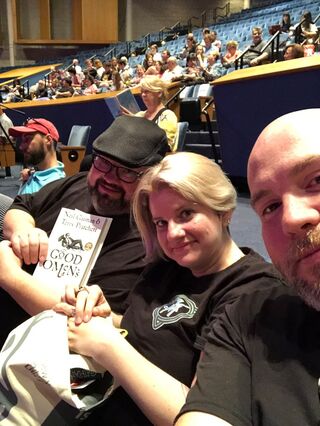 Last week, I began a series talking about some of the challenges I face in my writing. We started by tackling the hobgoblin of writer's block, and exposed it for what it truly is, a clever excuse NOT to write. Today we continue the series with a look at something far more dangerous to creativity . . . GUILT. "Every man is guilty of all the good he did not do." - Voltaire. In a nutshell, guilt is the emotion we feel when we act (or fail to act) in accordance with what we know to be right. I would say more, but it is a universal experience. It is the crushing emotion we all get the first time a parent looks us in the eye and says, "I'm not mad. I'm just... disappointed." We've all been there. So when do I feel guilt as a writer, and why is it soul-crushing to my creativity? I feel most guilty as a writer when I'm NOT writing. It's during those quiet moments I steal for myself - watching a Phillies' game, playing on the PS4, taking a nap - when I know that I could be (should be) writing instead. And those are the magic words that conjure the demon we call guilt... "should be." By some long-lost alchemy, "should be" transforms our favorite hobby into something more resembling a job, if not a moral imperative. But doesn't that make GUILT a good motivator for writing? In my experience, it is impossible to work creatively while suffering under the burden of guilt. It drains our emotional energy and leads to feelings of resentment toward the work itself - in other words, it creates the exact opposite of the excitement and momentum required of a writer to dream up well-rounded characters, faraway settings, and dramatic plots. There's simply no way around it: Guilt kills creativity. What makes it even worse is that it begins a cruel cycle. I feel guilty for not writing, but because I feel guilty that makes writing more difficult. I blame my lack of creativity on writer's block and walk away from the computer, but then I feel guilty again for not writing. I sit back down at the keyboard, doubly guilty now, but any hope of being effective in my writing was lost hours ago. And on and on it goes... How do we break the cycle? I can offer two pieces of advice for dealing with guilt in my writing. The first is consistency. We must find a consistent time to devote to our writing. It doesn't have to be daily and it doesn't have to be hours upon hours. Carving out a couple hours once a week devoted entirely to writing can be all it takes. By writing consistently, we don't have to feel guilty for the other free moments when we're not writing. The routine itself fosters creativity. My other piece of advice is applicable after you find your routine. Invariably, you will fail at writing consistently, but in those moments, we need to be kinder to ourselves. Acknowledge that outside forces sometimes plot against our carefully planned routines, and instead of beating ourselves up over our failures, forgive ourselves and recommit to our writing moving forward. I started this series last week by teasing that only one of the three (Writer's Block, Guilt, and Ghosts) was real. Unfortunately, guilt is the one that's real, and it can absolutely kill our creativity if we let it. If you're a writer like me, there's no doubt you started because you love the act of writing and the joy it brings. Don't let feelings of guilt ruin that for you. Find your own routine, forgive yourself when you fail, and don't feel bad about taking those naps. I do some of my best writing when I'm asleep. In the meantime... #WriteOn 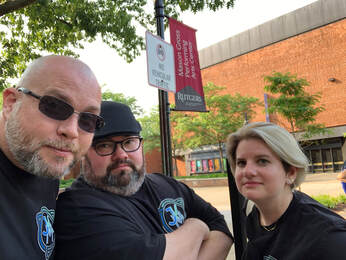 In an attempt to keep some of the momentum from last week's Rutgers Writers' Conference, and in a concerted effort to practice what I'm about to preach, I thought I should put out another post without waiting a full calendar year. Today I confront some of my own mental blocks to writing: Writer's Block, Guilt, and Ghosts. Fortunately, only one of these is real. Neil Gaiman once said, "I don't believe in writer's block, but I absolutely believe in getting stuck. The difference is one is imposed on you by the gods, and one is your own damn fault." Neil Gaiman Interview click here. I certainly recognize how foolish it would be to hold myself out as a writing authority on par with Neil Gaiman, but I feel so strongly about the myth we call Writer's Block that I have to add just a few words. First, let's all agree that Writer's Block is complete and utter bullshit. It's simply not a thing. It doesn't happen. As Gaiman ably points out, no other profession suffers from the dreaded block. There is no Teacher's Block or Parent's Block no matter how much we might wish it so ("Sorry, son, you'll have to do your own laundry today. I've got the Parent's Block."). I have, however, been "stuck" in my writing. I've experienced those moments in a story where I've taken a wrong step, and like the engine of car deprived of oil, the imagination seizes and will go no farther until the error is corrected. Your subconscious mind sees what your waking brain misses, and almost as a fail-safe, it stops you from compounding your mistakes. Once again, I'm not sure this experience is unique for writers. There have certainly been times in my teaching career when lessons have bombed. The only real difference in the experience is that you can't just throw on the brakes, stop the lesson mid-class, and sit down at your desk to figure out where your life went wrong. You push through the lesson the best you can, reflect on where it went off the rails, and try to do better the next time. You don't get to just stop teaching. And this is where I don't think Neil Gaiman goes far enough in his remarks. We need to call out Writer's Block and being Stuck for what they really are... excuses not to write. As writers, it's too easy to throw up our hands, blame the absent muse, and go about our days (or weeks or months) without touching a keyboard. Our writer's block becomes an excuse to ignore the discipline required for consistent writing. If we truly want to become better writers, we need to write and we need to write consistently. There is no sport, skill, or talent on earth that flourishes in disuse. Writing, just like golf or piano or laundry is refined in practice, and consistent practice is more effective than infrequent practice. So when a writer is stuck, it is important that we continue to carve out that time at our keyboards, clacking away. If a story won't move forward, try going back. Edit a previous chapter. Start something entirely new. Drop your lost character into a different setting and get to know them better. Try a writing prompt. Find a writing group - there is nothing like the deadline of a submission to your writers group to get the imagination-engine purring again. Whatever it takes, you have to write! You owe it to yourself and your talents not to ignore your craft. Getting stuck happens, but staying there is your choice. #WriteOn 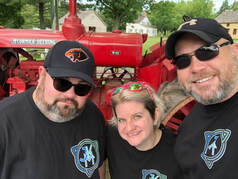 This past weekend I had the opportunity to attend the third annual Rutgers Writers' Conference. It was an amazing experience to spend time focused on the craft of writing, getting insights from talented writers who I truly admire, and best of all, spending the weekend with two of my favorite people - Mike Shaw and Kara Knauss from the Pitman Writers' Guild. So, in no particular order, here's Rutgers Writers' Con 2019:
All in all, it was a great weekend! I got to spend a fun morning with the students and staff of Myron L. Powell Elementary School. We talked about writing, revision, and Kira the Rainbow Princess. Students asked some very insightful questions, and I had the chance to speak to some very talented your writers. Thank you to the students and staff for the kind invitation to visit. Let's do it again!
Check out even MORE pictures from my visit under the MEDIA tab.  Two years ago, when I decided I would self-publish my first novel, I had no idea what was in store for me. I researched things on the internet and muddled my way through the process the best I could with a lot of trial and error. Fortunately, and with a ton of support from my friends and family, I was able to figure things out. I counted the result as a success. Now, as I publish my third novel, some steps in the process have become much easier... but there's still one walnut I haven't been able to crack. How do I maximize my novel's exposure? This is one area where I think traditionally published authors enjoy a huge advantage. Publishing houses can devote their resources to create timely advertising campaigns, they can ensure that novels get reviewed by well-read critics, and that books get prominently displayed in brick and mortar bookstores around the country. In a very real sense, self-published authors can't compete. Even so, there is one tool left in my arsenal to level this playing field... AND IT DEPENDS ENTIRELY ON YOU!!! Amazon.com, the juggernaut of electronic retail, already has a system in place to market my book to potential customers. This is great news for me because Amazon is really, really good at selling stuff. They use a complex algorithm that is mostly shrouded in mystery, although it undoubtedly draws on both advanced calculus and dark elven magic to find the most likely consumers of certain products. No one can say for sure how it all works, but what we do know, beyond any shadow, of a doubt is this: BOOK REVIEWS ARE GOOD! So this is what I'm asking... if you've read Kira and the Rat Queen please (PLEASE!) consider leaving an HONEST review of the book on Amazon. It is the single most important thing you can do to help me succeed as a writer. Writing a book review is easy. You don't have to be witty, or insightful, or long-winded. Just be honest. If you like the book, that's great! Tell people why you like it. If you didn't like the book, that's okay too. Let people know what didn't sit right with you. Your review will let the Amazon Algorithm know that people are interested in my book, and it is more likely to suggest Kira and the Rat Queen to potential readers. It's that simple, but the benefit to me is immeasurable. Other than that, I hope you all enjoy my newest entry in the Rainbow Princess Chronicles. Please plan on joining us Saturday, December 16th from 1:00 p.m. - 3:00 p.m. at the Pitman Gallery and Art Center for our launch party. You can find out more details about the launch party here. 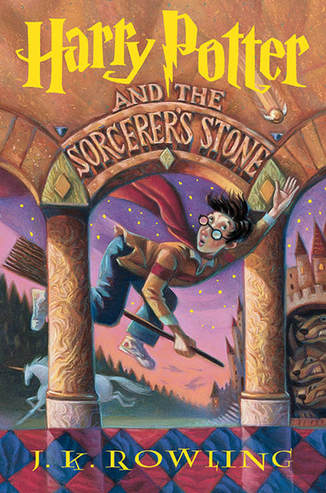 Next weekend, my small hometown will be transformed into a virtual Hogwarts as we celebrate our first annual Potter Festival. While excitement and anticipation are reaching a fever-pitch in the James' house, it also leaves me contemplating the impact of J.K. Rowling and her Harry Potter novels on my own writing. Admittedly, I'm not a Potter superfan like the rest of my family, but there are certainly lessons to be learned from this extraordinary series. One of my takeaways from the Harry Potter universe is the way in which J.K. Rowling grows her novels with her audience. The first novel in the series, Harry Potter and the Sorcerer's Stone (or Philosopher's Stone for all you Anglophiles), clocks in at just under 77,000 words and it serves as a fun adventure about a boy adapting to a new, magical world. However, the final entry in the Harry Potter series, Harry Potter and the Deathly Hallows, tips the scale at over 198,000 words, and it reads like a war story littered with the bodies of beloved characters. So, for J.K. Rowling, both the depth and the tone of her novels has changed to meet the demands of her audience. This make perfect sense when you consider a decade passed between the release of the first and final book. After all, very few of us would choose to read the same novels at the ages of 10 and 20. I've tried to adapt a similar strategy with the Rainbow Princess Chronicles. Kira and the Rat Queen, the second book in the series, is currently just over 37,000 words... that's 10,000 more words than Kira the Rainbow Princess. Likewise, just like J.K. Rowling, I've tried to mature the tone of my novel while still keeping the spirit of the original. This, more than increasing word count, has proved the more difficult challenge. It becomes a fine line between "more" and "too much". I wanted Kira and the Rat Queen to be scarier... but not scary. I wanted the risk to Kira and her friends to be greater... but never overwhelming. I wanted the tone to be darker... without descending into Roald Dahl territory. Hopefully the efforts will prove successful. I've planned SEVEN books in the Rainbow Princess Chronicles, one for each color of the rainbow. That's a minimum of seven sears. I want to keep writing stories that Aidan and Fiona will enjoy as much when their 17 and 15 as they did when they were 10 and 8. Just like Harry Potter, maybe Kira and her readers will grow up together. A couple of weeks ago I invited everyone to send in their questions regarding my newest novel, Kira and the Rat Queen. I received a number of responses and I'm going to try to answer some of the more common questions today.
Q: When will Kira and the Rat Queen be available? A: This is far and away the most common question I've received since announcing the Kira sequel. Unfortunately, at this stage of the writing process, it's still impossible to specify an exact release date. That being said, I'll be happy to talk through the remaining hurdles as we work towards publication. On Monday, October 9th, I will send my third draft of the Kira manuscript to my editor, Liam Carnahan, at Invisible Ink Editing. Liam will spend the next 2-4 weeks picking my writing apart, and eventually, he'll send me back a much better novel. Then it's up to me to review Liam's proposed changes and put the finishing touches on my fourth and final draft. At that time, I'll be comfortable settling on a release date, even as I work to get the cover designed and the novel formatted for Amazon. The good news is, Kira and the Rat Queen is on a very similar schedule to Kira the Rainbow Princess from last year. Hopefully the novel will be ready for release by Thanksgiving, and we can plan on a launch party in early December, just in time for Christmas. Q: Do you need to read Kira the Rainbow Princess to understand Kira and the Rat Queen? A: Kira and the Rat Queen picks up three days after the end of Kira the Rainbow Princess. I've tried to include a brief backstory about what Kira is doing in this magical world (she's there to rescue her parents), but it's really just enough so that a reader won't be completely lost if they haven't read the prequel. All of Kira's friends appear in this novel, and not a lot of time is devoted to introducing Snugg, Fred, and Ben. So the short answer is, it's not necessary... but I think you would like Kira and the Rat Queen much more if you're familiar with the events and characters in Kira the Rainbow Princess. Q: Are you still available to visit schools/give talks about your writing? A: After the publication of Kira the Rainbow Princess, I had the opportunity to visit a number of local schools and classrooms to talk about my novel and the writing process. Honestly, it was probably my favorite part in the entire novel writing experience... getting to share my passion and excitement for these characters with young people who were just as invested in my story as I was. Hopefully, I'll get to visit again this year. I'll include a link to my One Sheet (a single sheet of paper with my background and contact info) and I'll post the One Sheet to the "Media" page on the site. Feel free to share this information or to reach out if you would like me to arrange a visit to your student's classroom. |
Archives
June 2020
Categories |
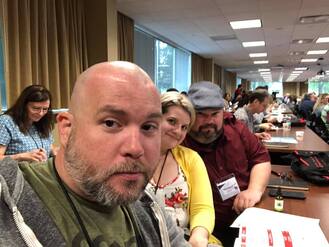
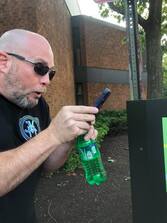
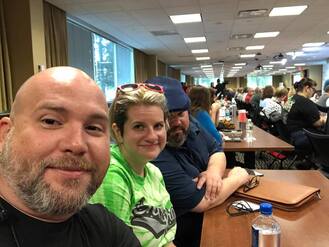
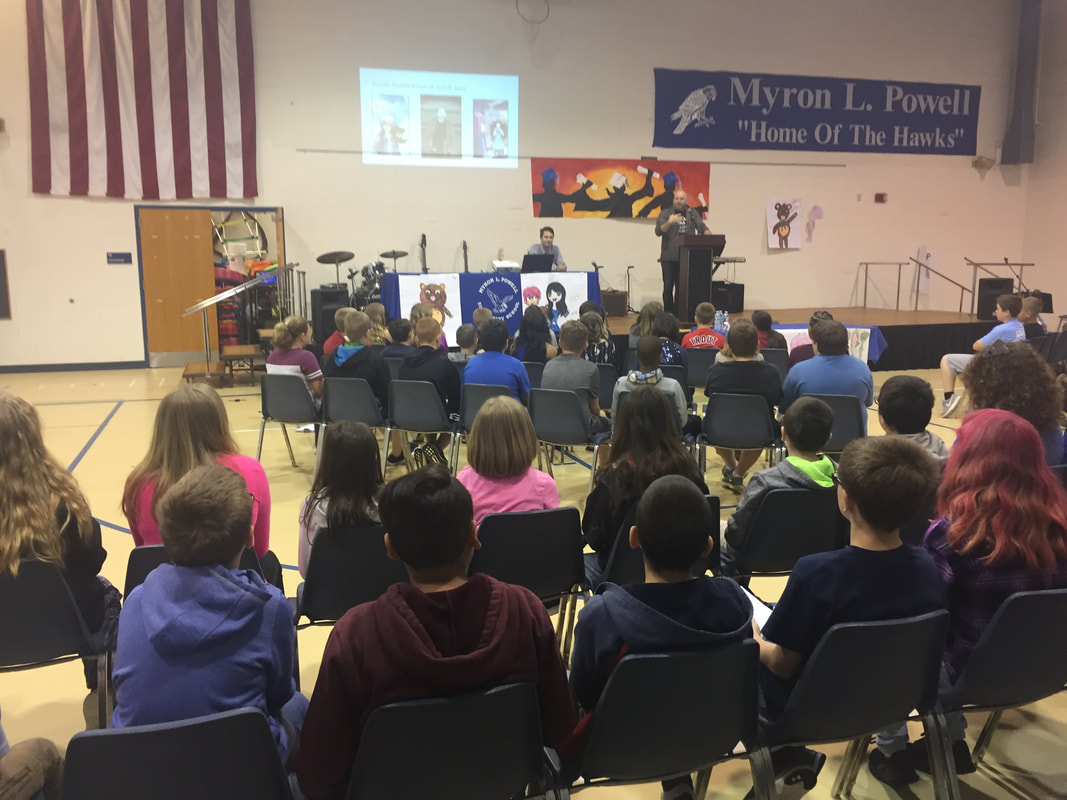

 RSS Feed
RSS Feed